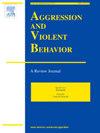“热”与“冷”情境下的执行功能与攻击性:两项元分析
IF 3.4
2区 心理学
Q1 CRIMINOLOGY & PENOLOGY
引用次数: 0
摘要
虽然执行功能(EF)缺陷已被证明是攻击行为的一个危险因素,但对这些认知过程的冷热成分及其与被动攻击和主动攻击的联系知之甚少。对两项研究进行了荟萃分析,包括基于绩效的EF测量和反应性攻击测量(37个独立样本;N = 5427)或主动攻击(16个独立样本;n = 4243)。还进行了亚组分析和meta回归。EF减少与反应性攻击(g = - 0.45)的关系比与主动攻击(g = - 0.14)的关系更强,大多数研究都是在寒冷环境下评估EF的。适度分析显示,在使用分类方法评估反应性攻击的研究中,通过比较从事攻击行为的个体与对照组,效果显著较大。关于被动攻击和主动攻击的热英语研究有限,这表明需要进一步研究热语境下的热英语。研究结果增加了我们对EF作为反应性和主动性攻击的神经认知关联的认识,并指出了针对冷EF缺陷来减少攻击的可能性。本文章由计算机程序翻译,如有差异,请以英文原文为准。
Executive functions and aggression in “hot” and “cold” contexts: Two meta-analyses
Although executive function (EF) deficits have been documented to be a risk factor for aggressive behavior, little is known about the hot and cold components of these cognitive processes and their links with reactive and proactive aggression. Two meta-analyses were conducted on studies that included a performance-based measure of EF and a measure of reactive aggression (37 independent samples; n = 5427) or proactive aggression (16 independent samples; n = 4243). Subgroup analyses and meta-regression were also performed. Reduced EF was more strongly associated with reactive (g = −0.45) than proactive aggression (g = −0.14), with the majority of studies assessing EF in cold contexts. Moderation analysis revealed significantly larger effect sizes in studies that assessed reactive aggression using a categorical approach by comparing individuals who engaged in aggressive behavior with control groups. The limited body of research on hot EF in relation to reactive and proactive aggression indicates a need for further investigations of EF in hot contexts. Findings add to our knowledge about EF as a neurocognitive correlate of reactive and proactive aggression and point to the possibility of targeting deficits in cold EF to reduce aggression.
求助全文
通过发布文献求助,成功后即可免费获取论文全文。
去求助
来源期刊

Aggression and Violent Behavior
Multiple-
CiteScore
7.50
自引率
4.30%
发文量
63
期刊介绍:
Aggression and Violent Behavior, A Review Journal is a multidisciplinary journal that publishes substantive and integrative reviews, as well as summary reports of innovative ongoing clinical research programs on a wide range of topics germane to the field of aggression and violent behavior. Papers encompass a large variety of issues, populations, and domains, including homicide (serial, spree, and mass murder: sexual homicide), sexual deviance and assault (rape, serial rape, child molestation, paraphilias), child and youth violence (firesetting, gang violence, juvenile sexual offending), family violence (child physical and sexual abuse, child neglect, incest, spouse and elder abuse), genetic predispositions, and the physiological basis of aggression.
 求助内容:
求助内容: 应助结果提醒方式:
应助结果提醒方式:


